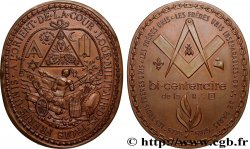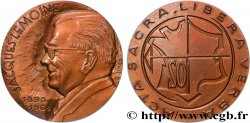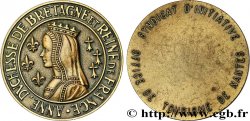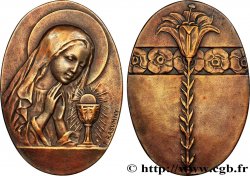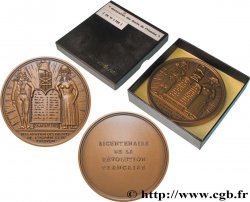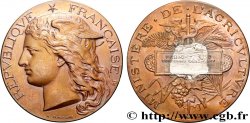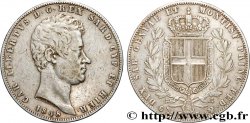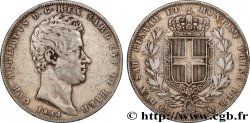fme_1053516 - FUNFTE FRANZOSISCHE REPUBLIK Médaille, Bicentenaire de la Révolution, Déclaration des droits de l’homme et du citoyen
40.00 €
Menge
In den Warenkorb

Type : Médaille, Bicentenaire de la Révolution, Déclaration des droits de l’homme et du citoyen
Datum: 1987
Name der Münzstätte / Stadt : Monnaie de Paris
Metall : Bronze
Durchmesser : 77 mm
Stempelstellung : 12 h.
Graveur PEDRON Michel (1943-)
Gewicht : 245,89 g.
Rand lisse + corne BR + 1987
Punze : corne BR
Kommentare zum Erhaltungszustand:
Jolie patine hétérogène. Présence de minimes points d’oxydation et rayures sur la tranche
Vorderseite
Titulatur der Vorderseite 26 AOÛT 1789 / DÉCLARATION DES DROITS / DE L’HOMME ET DU / CITOYEN.
Beschreibung Vorderseite Déclaration surmontée d’un bonnet phrygien et encadrée par deux personnages, un homme et une femme. Signé: M. PEDRON.
Rückseite
Titulatur der Rückseite BICENTENAIRE / DE LA / RÉVOLUTION / FRANÇAISE.
Beschreibung Rückseite Légende en 4 lignes horizontales.
Kommentare
Médaille conservée dans un écrin en carton marron de la monnaie de Paris.
La Déclaration des droits de l'homme et du citoyen (parfois abrégée en DDHC) de 1789 est un texte fondamental de la Révolution française, qui énonce un ensemble de droits naturels individuels et les conditions de leur mise en œuvre. Ses derniers articles sont adoptés le 26 août 1789.
La Déclaration est un des trois textes visés par le préambule de la Constitution française du 4 octobre 1958. Sa valeur constitutionnelle est reconnue par le Conseil constitutionnel français depuis 1971. Ses dispositions font donc partie du droit positif français, et se placent au plus haut niveau de la hiérarchie des normes en France..
Medal preserved in a brown cardboard case from the Paris Mint. The Declaration of the Rights of Man and of the Citizen (sometimes abbreviated as DDHC) of 1789 is a fundamental text of the French Revolution, which sets out a set of individual natural rights and the conditions for their implementation. Its final articles were adopted on August 26, 1789. The Declaration is one of the three texts referred to in the preamble to the French Constitution of October 4, 1958. Its constitutional value has been recognized by the French Constitutional Council since 1971. Its provisions are therefore part of French positive law, and are at the highest level of the hierarchy of norms in France.
La Déclaration des droits de l'homme et du citoyen (parfois abrégée en DDHC) de 1789 est un texte fondamental de la Révolution française, qui énonce un ensemble de droits naturels individuels et les conditions de leur mise en œuvre. Ses derniers articles sont adoptés le 26 août 1789.
La Déclaration est un des trois textes visés par le préambule de la Constitution française du 4 octobre 1958. Sa valeur constitutionnelle est reconnue par le Conseil constitutionnel français depuis 1971. Ses dispositions font donc partie du droit positif français, et se placent au plus haut niveau de la hiérarchie des normes en France..
Medal preserved in a brown cardboard case from the Paris Mint. The Declaration of the Rights of Man and of the Citizen (sometimes abbreviated as DDHC) of 1789 is a fundamental text of the French Revolution, which sets out a set of individual natural rights and the conditions for their implementation. Its final articles were adopted on August 26, 1789. The Declaration is one of the three texts referred to in the preamble to the French Constitution of October 4, 1958. Its constitutional value has been recognized by the French Constitutional Council since 1971. Its provisions are therefore part of French positive law, and are at the highest level of the hierarchy of norms in France.








 Berichten über einen Fehler
Berichten über einen Fehler Die Seite drucken
Die Seite drucken Teilen meiner Auswahl
Teilen meiner Auswahl Stellen Sie eine Frage
Stellen Sie eine Frage Einlieferung/Verkauf
Einlieferung/Verkauf
 Details
Details
